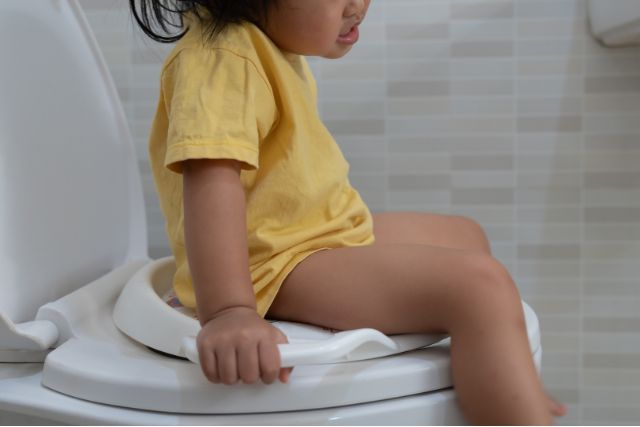Discover effective and quick solutions on how to relieve constipation in babies quickly. Our comprehensive guide provides practical tips, safe remedies, and expert advice to ease your baby’s discomfort.
Recently my 3-year-old baby had a tough time passing stool. I guess the poop was hard and quite big, thus could not find a way out through his small outlet.
The groaning while sitting on his potty was so disturbing that his papa couldn’t finish breakfast because of seeing the son in that state.
Leave alone papa’s reaction,
You needed to have seen my face. It was almost turning red.
Trying to force someone in pain and discomfort to push harder for the poop to come out is not a joke.
I know it’s wrong to force things, mama, and the damage can be enormous.
But what do you do with the panic and pain around you?
Nothing puts a mother down like feeding a baby who is not going for a long call. The worry, tummy pain, and maybe the screens associated with baby constipation are something else.
It is even worse with a baby who cannot explain their feelings. You must use intuition and maybe go around and check almost all body parts before concluding the case.
In this post, I will dig deep about simple home remedies that may help ease constipation or help your baby poop faster. Its about how to relieve constipation in babies quickly.
Here we go.
How To Relieve Constipation In Babies Quickly (0 to 6 months)
Constipation is a condition where one struggles to empty the bowels. This can happen because of poor diet, dehydration, or medical condition.
According to pediatricians, newborn babies who are on exclusive breastmilk hardly constipate. They may go for a while without pooping, but that doesn’t necessarily mean they are constipating.
According to the doctors, breastmilk is a natural laxative, quite digestible, and the absorption is almost 99% leaving nearly no residues to compose poop daily. But, this argument does not rule out constipation in breastfed babies as it sometimes occurs.
Can Formulas Cause Constipation in Babies?
If you have introduced formulas in the baby’s diet, it may sometime cause constipation. This happens since some babies react differently depending on the type of formula.
According to Dr. Lukuku of Chamblee Nursing Institute, wrong mixing or poorly rationing of water and formulae powder may cause constipation, especially at the introductory level.
Adding more powdered formulae with less water can cause dehydration, thus prompting gastrointestinal irritation.
Likewise, baby formulas come in different forms, and you may not know which one will react with your baby. For instance, you may either get
- powders
- concentrates
- ready-to-use
And, within these forms, you will still have to think about whether to choose:
- milk-based formulas
- soy-based formulas
- organic formulas
While trying to determine what can work for your baby, other milk formulas may cause constipation.
Related: Here are 10 Must-Have Survival Skills for Mothers with Under -3-Year-Old Kids
How do you know if your baby is constipated?
Baby constipation comes in various forms, and these may include;
- Fewer bowel movements; although this is common with newborns, sometimes it may indicate the beginning of constipation. If your baby is past 5 days without going for long calls, you should try applying some remedies to enable them to poop.
- Hard poop; if your baby is getting pellet-like poop or hard balls, it may indicate constipation.
- The baby is straining and having a painful bowel movement. Sometimes you may find blood in the stool, indicating a minor tear in the anus.
- Hard tummy that appears bloated
- Low appetite
- They feel like they cannot completely empty the poop from their rectum.
0 to 6 months old babies’ constipation remedies
While there are many laxatives, babies below 6 months are pretty delicate, and as such, you need to be careful not to administer any medication without a doctor’s approval.
Consequently, I have found that practicing the following activities can help ease constipation in newborns. These activities include
1. Giving your baby a warm bath and tummy massage
Warm baths are excellent muscle relaxers and a better remedy on how to relieve constipation in babies quickly. Bathing your constipated baby helps to relax the abdominal muscles and thus can relieve them of tummy discomfort.
After a warm bath, gently massage the baby’s tummy in a clockwise direction. Applying gentle strokes around your baby’s stomach can help stimulate the abdominal nerve, which can speed up the pooping process.
The secret to tummy massaging is to do it as a routine from the early days of your newborn. Doing so becomes more of a preventive measure than a cure.
Warmth can also help relax the anus and the tummy for quick bowel movements. If you’re not able to bathe them in warm water, placing a warm piece of cotton cloth around their belly or anus for about ten minutes may help ease the constipation menace by relaxing their abdomen.
Newborn Baby’s First Bath: Here is a Simple Step-By-Step Guide On How to Bathe Your Newborn Baby
2. Incorporate bicycle motions for baby Legs
When combined with tummy massage, moving your baby’s legs can help ease constipation. The idea behind bicycling your baby’s legs is to help relax the anus and ease poop flow. To perform the exercise;
- Lay the baby on the back.
- With their legs bending halfway, lift them and try moving them as though they are riding a bicycle.
- As you cycle their legs, gently press their knees toward the chest a few times. This feels like squatting for a baby, and it may help them push outwards instead of holding.
If it still doesn’t work, you may try inserting a Vaseline-greased thermometer or even use small-sized soap. Your soap should be the same size as a thermometer, and you must first immerse it in water to make it foamy and slippery. Insert just one-half inch into the anus.
Babies usually respond by pushing outward because of the object trigger. The slipperiness will also aid the poop to come faster.
3. Reflexology for Relieving Constipation In Babies quickly
Reflexology is a therapeutical massage aiming at specific points on the feet and hand that are believed to have a direct link to internal organs.
According to a reflexology specialist, massaging specific parts like the solar plexus in the foot can relieve the constipated baby. They induce calmness and foster relaxation in the abdomen, thus encouraging the flow in the bowels.
Doing heel tap therapies can stimulate the nerve endings for soothing and relaxation in a baby. Likewise, Gently tummy touches are also effective when it comes to helping tummy bloating and relieving constipation in babies.
4. Tummy time after the umbilical cord falls off
There is no better way of engaging your baby’s abdominal muscles than putting them on a tummy.
Tummy time is an excellent way of strengthening and engaging your baby’s abdominal muscles. As they lie and try to crawl around, they put gentle pressure on the bowel and abdominal organs.
This simple activity can help them pass gas and stimulate proper bowel movement.
Incorporating tummy times in your baby’s daily schedule can help reduce constipation by strengthening abdominal muscles.
5. Breastfeed more
Eat a good diet with more water for more breast milk. Sometimes babies skip pooping because they hardly get enough, especially those on exclusive breast milk.
If you are way or back to work, expressing and storing milk will be your best bet for your baby’s satisfaction. Ensuring your baby gets enough milk may be a good way of preventing constipation through constant pooping.
How To Relieve Constipation In Babies Quickly (6 Months and Beyond)
Attaining six months is a significant milestone for a baby. By this age, most infants are probably sitting on their own or have started crawling.
The American Academy of Pediatrics, advocates for introducing solid or complementary foods when your baby attains 6 months, of course, with a few exceptions.
At six months, it’s presumed that your baby’s digestion system is ready for the hard stuff. But still, then there can be constipation as their digestive tracks adjust to accommodate different blends of food.
How do you help a constipated baby who is on complementary foods?
1. Use hot drinks to relieve constipation in babies
All-time mommies swear that hot drinks are the fastest way to stimulate bowel movement in toddlers.
Older moms believe that giving your constipated baby a warm beverage improves bowel movements since the heat causes the blood vessels in the digestive system to dilate, making way for the poop to pass.
Whether it’s a warm cup of vegetable soup, plain water, or green tea, making your baby something warm may help ease constipation.
2. Add more fluids like water and juices in between meals
Dehydration is a common cause of constipation, and drinking plenty of water can often help ease or resolve the symptoms.
When a person becomes dehydrated, their intestines cannot add enough water to stools. This results in hard, dry, and lumpy stools and can lead to constipation.
Make sure you give your baby water in between meals and after snacking. You may also boost the fluid levels by incorporating fruit juices into their menu.
The best fruit juices for constipated babies may include apple, prune, or pear juice.
According to research, these juices contain sorbitol, which acts as a laxative, thus stimulating bowel movement. Worthy to note, however, is that prune juice is not recommended for infants below one year. And as such, you may need to consult your pediatrician before administering.
3. Add more fiber through Fruits and vegetables
Dietary fiber is crucial for digestion. Whether soluble or insoluble fiber, either type is essential in your diet to increase the weight and size of the poop and soften it for easy movement.
Soluble fiber tends to absorb water in the digestive system, making the poop softer, while insoluble fiber is mainly for making the stools bulkier.
A bulky stool is easier to pass, thus limiting the chances of constipation. Likewise, loose or watery stools may be solidified by fibers by absorbing water from them.
Children aged 1-3 years may only require 19 grams of fiber per day, which you can easily obtain from fruits and vegetables.
Doing something as simple as adding spinach to your baby’s food can go a long way in relieving constipation. Similarly, fruits like mangoes, oranges, and papaya have high fibers and are easy for a toddler to consume.
4. Whole grain cereals
This is my all-time favorite remedy for constipation in toddlers. Whole grain cereals are rich in insoluble fiber. It can help speed up bowel movement in the digestive tract.
One study suggests that eating cereals containing wheat bran daily for at least two weeks could help reduce constipation.
There are so many baby cereals available in local supermarkets. Try incorporating them into your baby’s diet, even if it’s just twice a week, to help with digestion.
Instead of giving processed foods, you may want to dwell more on whole wheat products like whole-wheat bread, pasta, and cereals.
5. Introduce one food type at a time
The American Academy of Pediatrics recommends that you should introduce one single-ingredient food at a time when starting your baby on solid. This gives you time to gauge how your child reacts to that specific food type.
During the grace period of about 3 to 5 days, you can detect any problems in your baby or whether they are reacting to that particular type of food.
Additionally, ensure that you give your baby a small feed, several times. Avoid forcefully overfeeding your baby to prevent vomiting and possible constipation.
6. Include essential oils like coconut and olive oil
Essential oils like coconut, olive, and flax seed contain a mild laxative effect. They are also excellent antioxidants with antibacterial and anti-inflammatory properties.
With these laxative properties, these essential oils can increase metabolism in the digestive system, thus helping a constipated baby pass the poop faster.
One study also shows that essential oil like olive and flax seeds effectively treat constipation in hemodialysis patients.
For best results, use extra virgin oils that have not undergone much chemical processing.
You may consider trying a spoonful of one of these oils mixed with a glass of orange juice, a cup of warm milk, or yogurt. You may also use the oil as a salad dressing or in cooking.
Also, due to their laxative properties, ensure that your baby consumes these oils in small doses to avoid diarrhea.
7. Probiotics are also essential
Dairy products with live microorganisms, also known as probiotics, are good constipation relievers in toddlers. Give your child probiotic yogurts or fermented products to improve their gut health.
One study suggests that probiotic yogurts containing good bacteria like Lactobacillus acidophilus and Bifidobacterium lactis can effectively treat constipation.
Try incorporating yogurt or kefir products in-between meals, as this may improve digestion in your baby and reduce the severity of constipation.
8. Let your child remain active
Encourage your toddler to remain active even when they are constipated. Light activities like walking them outdoors can be a good idea.
Some studies suggest that exercising your body to remain active may increase blood flow to the abdomen, just like the rest of the body. And as such, the increase in blood flow may stimulate bowel movement.
Related: 7 Unwritten Baby Routines that Sustained My Sanity In the first 3 Months After Childbirth
9. Incorporate colonic massage to relieve constipation in babies
Sometimes if the primary cause of constipation is slow bowel movement in the colon, then a simple colon massage after warm bathing may be what your baby needs to feel better.
Do not underestimate the importance of abdominal massage in babies, even if they look old and have started feeding on solid foods.
Other Options for Treating Constipation in Infants
Treatment of constipated babies will typically start with home remedies. However, If home remedies do not work, your professional health care provider may examine the baby and, in some cases, prescribe medications, like:
- Laxatives; Laxatives contain chemicals that help increase stool motility, bulk, and frequency — thus relieving temporary constipation.
- Stool softeners
- suppositories
Best Toilet Practices with Toddlers
- Encourage your baby to poop whenever they feel like it by creating a routine. For example, put them on their potty in the morning when they wake up or after a meal.
- Create a friendly environment that applauds best toilet practices instead of instilling fear in children by punishing them; for example, punishing your baby for improper potty use can create a negative feeling towards pooing. They will want to postpone going to the toilet to avoid being punished.
- If you’re changing environment, ensure you carry along with toiletries that they are familiar with to avoid stressing them with new items, especially where they have to relearn how to use them.
- Ensure you train your baby about the best toilet position, like squatting. Squatting is a natural position that encourages the passing of stool without straining.
Takeaway
My one-day Constipation cure Formula
Over time, I have perfected the art of helping my constipated toddler in one day or atleast 12 hours, to be precise. Here is how I do it:
- I will give them 1 -2 pieces of papaya before breakfast, depending on how severe the constipation is.
- After a while, I will give them a simple fiber-rich breakfast like oatmeal.
- I will give them a glass of orange juice if things have not kicked off by mid-day. Please remember not to sieve your blended juice but serve it whole with bagasse (pulp, rind, and seeds), which have high fiber.
- I’ll finish my home remedy day by mixing a spoonful of pure virgin coconut oil into a glass of yogurt and letting my toddler drink. I am sure the hard poop will be on its way out by then.
DISCLAIMER The information contained in this post is for general information purposes only. I’m not a health practitioner and as such, this information should not be used as a substitute for consultation with your professional service provider.




